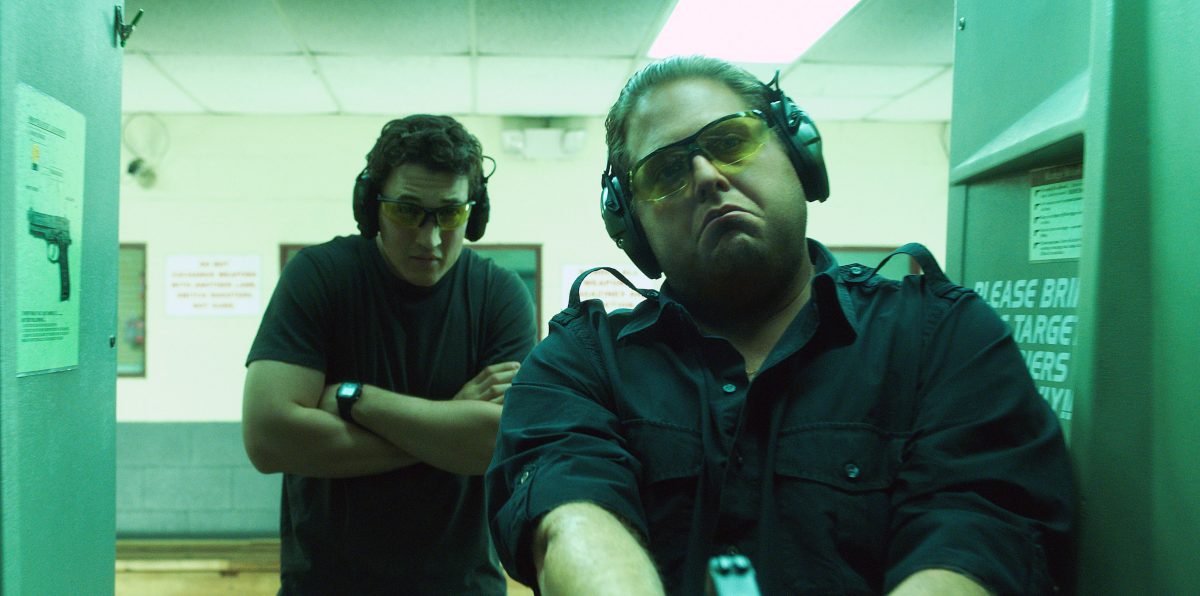
This review contains some language and imagery that is only suitable for mature readers.
Todd Phillips made a name for himself directing profane and wildly popular buddy comedies like The Hangover and Old School. So War Dogs, a somewhat more serious movie based on a true story about a pair of enterprising young arms dealers, seemed like his chance to break free from that mold and do something more personal, even auteurist. In fact, the film is auteurist . . . except that auteur is Martin Scorsese.
Everything in this film, from the voiceover narration, to the familiar rock ‘n’ roll and Sinatra musical cues, to the freeze frames, to the tale of reckless and ambitious young men behaving badly, seems lifted directly from the Scorsese playbook. To be clear, it’s just a bad simulacrum, nowhere close to the real thing. Honestly, I think Phillips showed more of a filmmaker’s voice in the Hangover films.
Our hero and narrator is David Packouz (Miles Teller), a nice guy just trying to earn a living, first as a massage therapist, then by selling high-thread-count sheets to retirement homes. (The latter is such a horrible idea, one wonders if David is supposed to be a moron.) (He isn’t.) At a friend’s funeral, he runs into his old buddy Efraim Diveroli (Jonah Hill), who has just started his own gun running business, picking up small Pentagon jobs the bigger defense companies pass over. (In this case, those small scraps are worth millions.) He asks David to partner with him.
David is reluctant at first, then changes his mind after he finds out that his girlfriend Izzy (Ana de Armas) is pregnant. (Lest there be any doubt, Izzy’s entire function in this movie is to fret about David, get mad when he lies to her, and be really, really, ridiculously good looking.)
The real David Packouz has a small cameo (he’s the guitarist at a nursing home where David tries to peddle his sheets) and although he’s not listed as one of War Dog’s producers, he certainly seems to have had some influence on the film. As depicted here, David is an overly impressionable, but indisputably good guy: Loyal, brave, above board as much as possible considering the sketchy company he keeps. It’s the coke-snorting, hooker-using, ethically-suspect Efraim who drags David down, convincing him it’s okay to lie or cheat when it suits their purposes. Like The Wolf of Wall Street, this is a story about ballsy young men who don’t play by the rules who make it big. (“Hustling their way to the American dream,” reads the film’s tagline.) The film mostly luxuriates in their dick-swinging antics and the enviable fruits of their labor (fancy cars, beautiful apartments, hot women)—with a tiny coda about what a bummer it is after they get caught.
Both leads are good—Teller is interesting enough as an actor to make even the generic David watchable; and Hill is having the time of his life with this rare alpha male part (usually, he’s playing a more nebbishy version of David’s character.) I saw the film with a film critic friend and afterward, we argued over whether Efraim was supposed to seductive, pathetic, or both. In my opinion, while Phillips certainly acknowledges Efraim is a scoundrel, he also sees him as an irresistible badass, in the vein of Gordon Gekko or Tyler Durden. If there’s any evidence that Phillips thinks he’s a loser, it’s not on screen (except that he’s played by Jonah Hill, no one’s idea of movie star glamorous). “Why don’t we skip straight to the third date where you’re blowing me in the back seat of the car,” Efraim says to a pretty young man woman at a club—and she neither slaps him nor says, “Dream on.” (She’s actually flattered and amused by the proposition.) Later, Efraim instantly fires an underling for daring to innocuously dispute him—Phillips’ lame attempt at a “You think I’m funny?” moment.
The film’s racial politics are also suspect: Early in the film, Efraim runs up to his drug dealer’s apartment, as David waits in the car. The dealer’s not home, but three black guys sitting on lawn chairs tell him that they can sell the drugs to him at just above cost. Efraim hands them $400 and they turn away, going back to their conversation. “Where are my drugs, man?” Efraim demands. They laugh derisively and one flashes a gun he has tucked into his jeans. With that, Efraim goes to his car and pulls a machine gun out of the trunk. The audience howls with cathartic laughter as the three men scramble. I’ll let you draw your own conclusions about that scene.
Nonetheless, War Dogs is a swift, slick, and muscular film (though probably not nearly as muscular as Phillips thinks it is), that will no doubt delight its target audience—bros and the people who love them. Mercifully, it’s not the two-and-a-half hours that a Google search ominously suggested, but a fairly lean two hours. I guess it illustrates that even watered down Scorsese can be moderately entertaining. But, to borrow a phrase: I’ve seen all of Martin Scorsese’s films and you, Mr. Phillips, are no Martin Scorsese.
